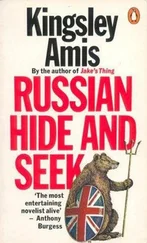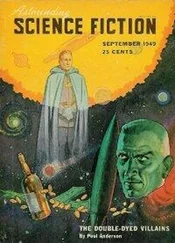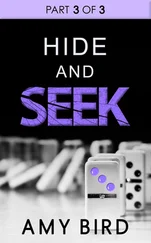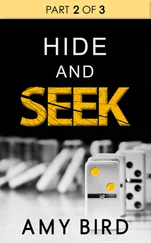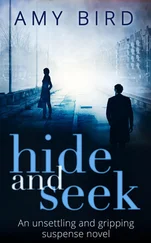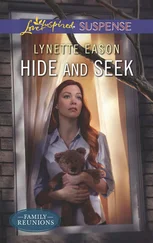Уилки Коллинз - Hide and Seek
Здесь есть возможность читать онлайн «Уилки Коллинз - Hide and Seek» весь текст электронной книги совершенно бесплатно (целиком полную версию без сокращений). В некоторых случаях можно слушать аудио, скачать через торрент в формате fb2 и присутствует краткое содержание. Год выпуска: 2005, Жанр: Классическая проза, на английском языке. Описание произведения, (предисловие) а так же отзывы посетителей доступны на портале библиотеки ЛибКат.
- Название:Hide and Seek
- Автор:
- Жанр:
- Год:2005
- ISBN:нет данных
- Рейтинг книги:5 / 5. Голосов: 1
-
Избранное:Добавить в избранное
- Отзывы:
-
Ваша оценка:
- 100
- 1
- 2
- 3
- 4
- 5
Hide and Seek: краткое содержание, описание и аннотация
Предлагаем к чтению аннотацию, описание, краткое содержание или предисловие (зависит от того, что написал сам автор книги «Hide and Seek»). Если вы не нашли необходимую информацию о книге — напишите в комментариях, мы постараемся отыскать её.
Hide and Seek — читать онлайн бесплатно полную книгу (весь текст) целиком
Ниже представлен текст книги, разбитый по страницам. Система сохранения места последней прочитанной страницы, позволяет с удобством читать онлайн бесплатно книгу «Hide and Seek», без необходимости каждый раз заново искать на чём Вы остановились. Поставьте закладку, и сможете в любой момент перейти на страницу, на которой закончили чтение.
Интервал:
Закладка:
Mrs. Joyce had to call three times to her daughters before she could get them to the luncheon-table. If she had possessed Valentine’s eye for the picturesque and beautiful, she would certainly have been incapable of disturbing the group which her third summons broke up.
In the center stood the deaf and dumb child, dressed in a white frock, with a little silk mantilla over it, made from a cast-off garment belonging to one of the ladies of the circus. She wore a plain straw hat, ornamented with a morsel of narrow white ribbon, and tied under the chin with the same material. Her clear, delicate complexion was overspread by a slight rosy tinge—the tender coloring of nature, instead of the coarsely-glaring rouge with which they disfigured her when she appeared before the public. Her wondering blue eyes, that looked so sad in the piercing gas-light, appeared to have lost that sadness in the mellow atmosphere of the Rectory dining-room. The tender and touching stillness which her affliction had cast over her face, seemed a little at variance with its childish immaturity of feature and roundness of form, but harmonized exquisitely with the quiet smile which seemed habitual to her when she was happy—gratefully and unrestrainedly happy, as she now felt among the new friends who were receiving her, not like a stranger and an inferior, but like a younger sister who had been long absent from them.
She stood near the window, the center figure of the group, offering a little slate that hung by her side, with a pencil attached to it, to the rector’s eldest daughter, who was sitting at her right hand on a stool. The second of the young ladies knelt on the other side, with both her arms round the dog’s neck; holding him back as he stood in front of the child, so as to prevent him from licking her face, which he had made several resolute attempts to do, from the moment when she first entered the room. Both the Doctor’s daughters were healthy, rosy English beauties in the first bloom of girlhood; and both were attired in the simplest and prettiest muslin dresses, very delicate in color and pattern. Pity and admiration, mixed with some little perplexity and confusion, gave an unusual animation to their expressions; for they could hardly accustom themselves as yet to the idea of the poor child’s calamity. They talked to her eagerly, as if she could hear and answer them—while she, on her part, stood looking alternately from one to the other, watching their lips and eyes intently, and still holding out the slate, with her innocent gesture of invitation and gentle look of apology, for the eldest girl to write on. The varying expressions of the three; the difference in their positions, the charming contrast between their light, graceful figures and the bulky strength and grand solidity of form in the noble Newfoundland dog who stood among them; the lustrous background of lawn and flowers and trees, seen through the open window; the sparkling purity of the sunshine which fell brightly over one part of the group; the transparency of the warm shadows that lay so caressingly, sometimes on a round smooth cheek, sometimes over ringlets of glistening hair, sometimes on the crisp folds of a muslin dress—all these accidental combinations of the moment, these natural and elegant positions of nature’s setting, these accessories of light and shade and background garden objects beautifully and tenderly filling up the scene, presented together a picture which it was a luxury to be able to look on, which it seemed little short of absolute profanation to disturb.
Mrs. Joyce, nevertheless, pitilessly disarranged it. In a moment the living picture was destroyed; the young ladies were called to their mother’s side; the child was placed between Valentine and Mrs. Peckover, and the important business of luncheon began in earnest.
It was wonderful to hear how Mr. Blyth talked; how he alternately glorified the clown’s wife for the punctual performance of her promise, and appealed triumphantly to the rector to say, whether he had not underrated rather than exaggerated little Mary’s beauty. It was also wonderful to see Mrs. Peckover’s blank look of astonishment when she found the rigid doctor of divinity, who would not so much as notice her curtsey, suddenly relax into blandly supplying her with everything she wanted to eat or drink. But a very much more remarkable study of human nature than either of these, was afforded by the grimly patronizing and profoundly puzzled aspect of Vance, as he waited, under protest, upon a woman from a traveling circus. It is something to see the Pope serving the Pilgrims their dinner, during the Holy Week at Rome. Even that astounding sight, however, fades into nothing, as compared with the sublimer spectacle of Mr. Vance waiting upon Mrs. Peckover.
The rector, who was a sharp observer in his own quiet, unobtrusive way, was struck by two peculiarities in little Mary’s behavior during lunch. In the first place, he remarked with some interest and astonishment, that while the clown’s wife was, not unnaturally, very shy and embarrassed in her present position, among strangers who were greatly her social superiors, little Mary had maintained her self-possession, and had unconsciously adapted herself to her new sphere from the moment when she first entered the dining-room. In the second place, he observed that she constantly nestled close to Valentine; looked at him oftener than she looked at any one else; and seemed to be always trying, sometimes not unsuccessfully, to guess what he was saying to others by watching his expression, his manner, and the action of his lips. “That child’s character is no common one,” thought Doctor Joyce; “she is older at heart than she looks; and is almost as fond of Blyth already as he is of her.”
When lunch was over, the eldest Miss Joyce whispered a petition in her mother’s ear, “May Carry and I take the dear little girl out with us to see our gardens, mamma?”
“Certainly, my love, if she likes to go. You had better ask her—Ah, dear! dear! I forgot—I mean, write on her slate. It’s so hard to remember she’s deaf and dumb, when one sees her sitting there looking so pretty and happy. She seems to like the cake. Remind me, Emmy, to tie some up for her in paper before she goes away.”
Miss Emily and Miss Caroline went round to the child directly, and made signs for the slate. They alternately wrote on it with immense enthusiasm, until they had filled one side; signing their initials in the most business-like manner at the end of each line, thus:—
“Oh, do come and see my gardens. E. J.”—“We will gather you such a nice nosegay. C. J.”—“I have got some lovely little guinea-pigs. B. J.”—“And Mark, our gardener, has made me a summer-house, with such funny chairs in it. C. J.”—“You shall have my parasol to keep the sun off. B. J.”—“And we will send Leo into the water as often as you like him to go. C. J.”—Thus they went on till they got to the bottom of the slate.
The child, after nodding her head and smiling as she read each fresh invitation, turned the slate over, and, with some little triumph at showing that she could write too, began slowly to trace some large text letters in extremely crooked lines. It took her a long time—especially as Mr. Blyth was breathlessly looking over her shoulder all the while—to get through these words: “Thank you for being so kind to me. I will go with you anywhere you like.”
In a few minutes more the two young ladies and little Mary were walking over the bright lawn, with Leo in close attendance, carrying a stick in his mouth.
Valentine started up to follow them; then appeared suddenly to remember something, and sat down again with a very anxious expression on his face. He and Doctor Joyce looked at one another significantly. Before breakfast, that morning, they had been closeted at a private interview. Throughout the conversation which then took place, Mr. Blyth had been unusually quiet, and very much in earnest. The doctor had begun by being incredulous and sarcastic in a good-humored way; but had ended by speaking seriously, and making a promise under certain conditions. The time for the performance of that promise had now arrived.
Читать дальшеИнтервал:
Закладка:
Похожие книги на «Hide and Seek»
Представляем Вашему вниманию похожие книги на «Hide and Seek» списком для выбора. Мы отобрали схожую по названию и смыслу литературу в надежде предоставить читателям больше вариантов отыскать новые, интересные, ещё непрочитанные произведения.
Обсуждение, отзывы о книге «Hide and Seek» и просто собственные мнения читателей. Оставьте ваши комментарии, напишите, что Вы думаете о произведении, его смысле или главных героях. Укажите что конкретно понравилось, а что нет, и почему Вы так считаете.


